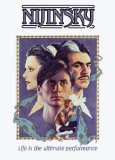| Reviews & Columns |
|
Reviews DVD TV on DVD Blu-ray 4K UHD International DVDs In Theaters Reviews by Studio Video Games Features Collector Series DVDs Easter Egg Database Interviews DVD Talk Radio Feature Articles Columns Anime Talk DVD Savant Horror DVDs The M.O.D. Squad Art House HD Talk Silent DVD
|
DVD Talk Forum |
|
|
| Resources |
|
DVD Price Search Customer Service #'s RCE Info Links |
|
Columns
|
|
|
Nijinsky
Opulent, well-mounted, but safe...and not only in terms of sex. Olive Films, which has been putting out lots of fun older Paramount library titles, has released Nijinsky, the 1980 biopic of the iconic Polish dancer and his mentor Sergei Diaghilev, directed by Herbert Ross, and starring Alan Bates, George de la Pena, Alan Badel, Leslie Browne, Carla Fracci, and Jeremy Irons (in his motion picture debut). The quickest way to i.d. Nijinsky as a product of 1980 filmmaking morays is to witness the antiseptic approach taken to the story's homosexual angle, but even barring that, the movie seems from an even earlier time: square, eminently respectful...and damn-near calcified. No extras for this good looking transfer.
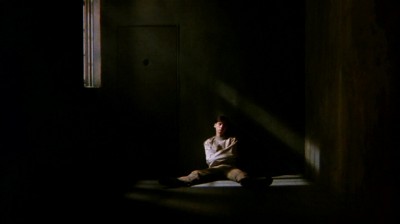
Budapest, 1912. In an opulent hotel room, Polish-born Russian dancer Vaslav Nijinsky (George de la Peña) lays sick in bed, waiting for his mentor and lover, Sergei Diaghilev (Alan Bates), to arrive. Diaghilev, constantly short of money, is searching for new sources of income to cover upcoming dates for his internationally famed dance company, the Ballets Russes, while star ballerina Tamara Karsavina (Carla Fracci), who helped discover the amazing Nijinsky, arrives to help the company. Financial aid comes from art patron Baron de Gunzburg (Alan Badel). Diaghilev's brilliant choreographer and artistic director, Mikhail Fokine (Jeremy Irons), is increasingly worried that Diaghilev is giving further license to his young lover, including letting Nijinsky choreograph his own specialty number, opening Diaghilev and the company up to ridicule when the young dancer inevitably fails. When push comes to shove, though, Diaghilev chooses Nijinsky and fires Fokine, and is eventually gratified by the wild success of Nijinsky's first effort. Controversy does come, however, when Nijinsky goes too far with the sexual content of one of his pieces, a controversy that is exacerbated by the negative reception of Nijinsky's ballet of Igor Stravinsky's (Ronald Pickup) Le Sacre du Printemps. On top of this, Nijinsky begins to show signs of mental illness, while unknowingly being pursued by aspiring dancer Romola de Pulsky (Leslie Browne), who is obsessed with the troubled dancer.
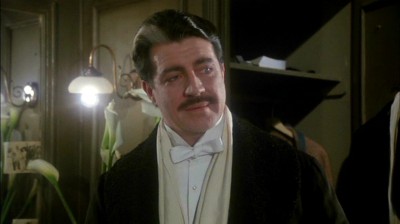
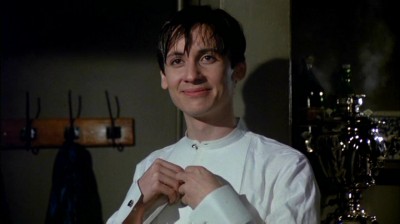
I remember quite a bit of critical anticipation for Nijinsky when it was in production. A big, glossy bio-pic of the 20th century's greatest dancer had been rumored before numerous times (Nijinsky nominal producer, Harry Saltzman, of the James Bond franchise fame, had tried unsuccessfully years before), and it was felt that by 1980, the sexuality of Nijinsky and his lover Diaghilev could be handled with a fair amount of explicitness. As well, director and former choreographer Herbert Ross had just come off a string of hits with the public and the critics, including 1975's Funny Lady and The Sunshine Boys, the Sherlock Holmes mystery, The Seven-Per-Cent Solution, the Oscar-nominated ballet drama, The Turning Point in 1977, and two more popular Neil Simon comedies, The Goodbye Girl and California Suite. Ross, never the most dynamic of filmmakers, was nevertheless clearly on a roll, and many thought the combination of his hit-making abilities and the controversial subject matter of Nijinsky spelled lots of awards and big box office.
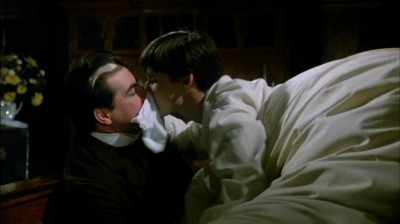
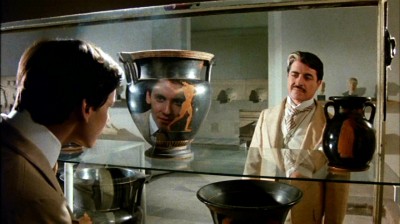
American audiences, however, couldn't have been more disinterested in Nijinsky, and avoided it like the plague, while critics were divided, some giving it kudos for its (at the time) matter-of-fact treatment of the leads' sexuality, while others derided it for its slow pace and uninvolving storyline. As for the general public...I'm not sure when that saw that title, that the name was really all that familiar to them. Now people familiar with dance and the arts and that time period would certainly know it, but I don't know if "Nijinsky" has the same stand-alone, iconic status as say, "Valentino," where even young people today seem to understand that moniker denotes something culturally important (although nobody went to that Ken Russell movie, either...). I can't say I knew too much (or anything, really) about Nijinsky's story then or now, but the name for me at least signified some kind of wild breaking away from the traditions of dance at that time (I know nothing about the history of dance), as well as the personal madness that enveloped him as he grew older. That seems like a lock for a compelling movie, particularly when you factor in the-then titillation and curiosity factor of the men's homosexuality―still not exactly a mainstream, matter-of-fact element in movies made only ten years outside of 1970's The Boys in the Band.
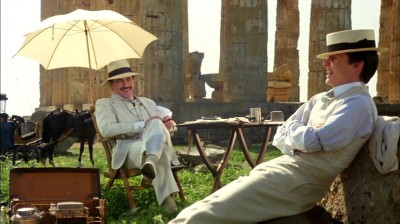
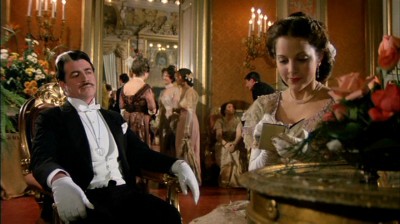
Unfortunately, Nijinsky seems to go out of its way to be hands-off, distant, and "proper," for lack of a better word, in all of its departments. First off, the dancing. Again, I'm no expert on ballet, but I've seen a few, and while it may not be cinematic to lock that camera off in the third row and shoot straight ahead...at least that way I'd see the dancers' feet, for god's sake. Here, the ballets snippets are so chopped up and distorted (slo-mo and too many close-ups, too) that I couldn't really get a feel for what everyone was so worked up about. You can't just tell me that Nijinsky was the world's greatest dancer, you have to show me what a genius he was, but inexplicably, ex-choreographer Herbert Ross makes the mistake of de-emphasizing the dancing here. We don't even get exposition as to why his choreography was so ground-breaking...we're just supposed to know why already. As for the film's love story, it's as cheated here as the dancing. It may have been the screenwriter's clever way around potential controversy at the beginning of the film to have Nijinsky sick in bed, necessitating Diaghilev giving him a kiss through a handkerchief, but when you realize later that that after a brief hug and a tentative ruffle of the hair that masked kiss will be the only expression of physical love between the two characters here, you get the feeling that maybe the producers were deathly afraid of showing the supposed sexual ardor between these two men. Now, most producers back in 1980, rightly or wrongly, wouldn't have believed that mainstream audiences (and even a lot of the "art crowd") were ready for Brokeback Mountain, but there's more demonstrative passion in your average Doris Day comedy than in Nijinsky. And it's not just the physical expression of that love that is missing, but also a clear sense of just exactly what their relationship entailed. There are dark intimations that perhaps the love affair is unconsummated, or that it has entered into a chaste period, but unfortunately, we have to guess at all of that (just like the dancing) because the movie is just as hands-off with the motivations as it is with the actions, if you will.
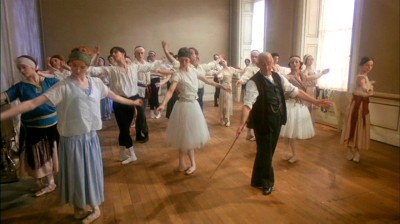
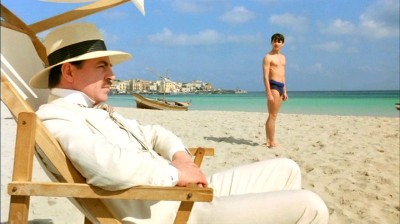
That lack of passion chills Nijinsky like a cold, wet blanket. One can't fault the tentative de la Peña too much for making no impact as the tortured, brilliant Nijinsky, considering the screenplay starts him at "11" in This is Spinal Tap terms and leaves him nowhere to go. Nijinsky's madness is ham-fistedly alluded to right away, giving the viewer no chance to understand his place in the movie. That way, there's no need to really explore his relationship with Diaghilev when we can have him start to go mental in the first reel. Bates gives a technically polished performance, but it's so removed and icy and "careful" that it's totally devoid of any dynamism. My understanding of Diaghilev is that he was a man capable of volcanic emotions and displays―where is that here? Bates uses his eyes to flash an emotion now and then, but he's largely inert in movement and voice, gliding through Nijinsky like an icebreaker going one knot through a frozen sea pack. Indeed, the whole look and feel of the film is petrified. While producer Stanley O'Toole was certainly no stranger to making movies that moved (The Italian Job, Running Scared, The Boys From Brazil, Outland, Quigley Down Under), director Herbert Ross' technique, even with his musical films (Goodbye, Mr. Chips, Funny Lady, Footloose), could be static as hell. Nijinsky just lays there with its gorgeous, too-careful art direction and sets (filmed on the cheap in Eastern Europe), with A-B-C framing and editing that does nothing to convey what should be a story overflowing with kinetic energy and fervent, obsessive dramatics. Nijinsky has the feel of the dreaded "Important Movie Making Process" (for examples...insert anything made by Sir Richard Attenborough), where everyone is convinced they have a subject that is so important they must treat it with over-cautious respect and phony dignity, resulting in a calcified product that not only doesn't come close to accurately representing its subject matter, but actually does it a disservice, giving the viewer the false impression that a fascinating story...is quite dull.
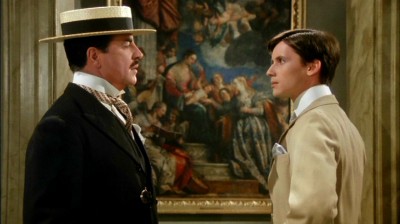
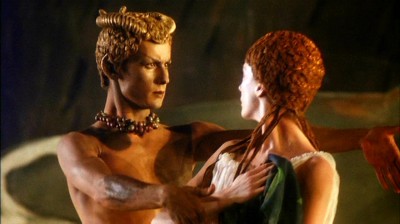
The DVD:
The Video:
The anamorphically-enhanced, 1.85:1 widescreen transfers for Nijinsky looks terrific, with glossy, correctly-valued color, a sharp image, and no compression issues to speak of here.
The Audio:
The English mono audio track is acceptable, with clean, low hiss background and crisp dialogue. No subtitles or closed-captions available.
The Extras:
No extras for Nijinsky.
Final Thoughts:
A passionless, inert movie about a subject matter that was anything but lifeless. I'm not sure who decided to de-emphasize the dancing in Nijinsky, but it was a huge mistake...and it didn't help matters that everyone here appears to be terrified of the homosexual angle of the story. Direction and performances are glacial. Dance historians (all 12 of you) will want to buy, but everyone else can safely skip Nijinsky.
Paul Mavis is an internationally published film and television historian, a member of the Online Film Critics Society, and the author of The Espionage Filmography.


|
| Popular Reviews |
| Sponsored Links |
|
|
| Sponsored Links |
|
|
| Release List | Reviews | Shop | Newsletter | Forum | DVD Giveaways | Blu-Ray | Advertise |
|
Copyright 2024 DVDTalk.com All Rights Reserved. Legal Info, Privacy Policy, Terms of Use,
Manage Preferences,
Your Privacy Choices | |||||||









